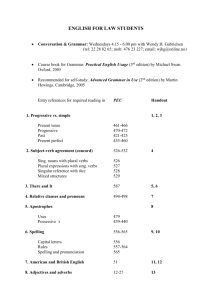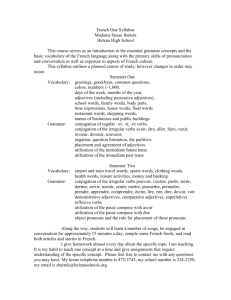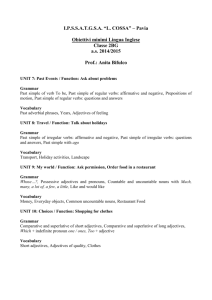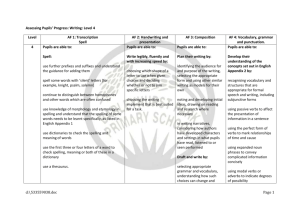Grade 7 - Rome International School
advertisement
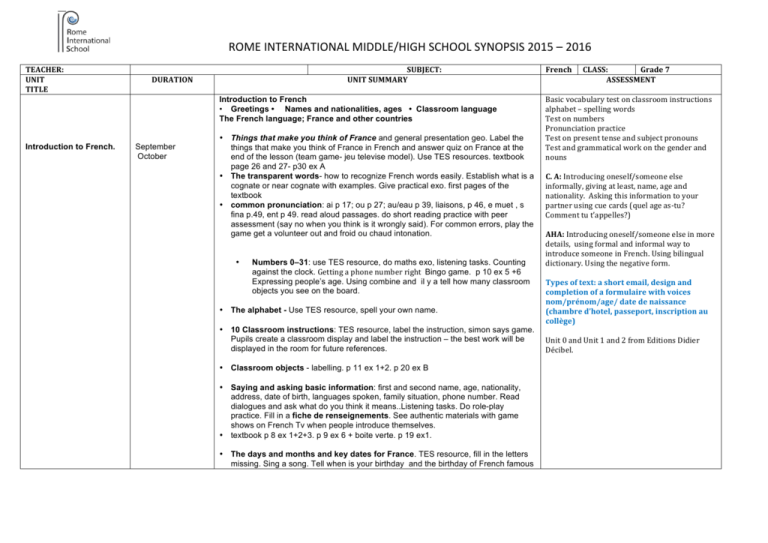
ROME INTERNATIONAL MIDDLE/HIGH SCHOOL SYNOPSIS 2015 – 2016 TEACHER: UNIT TITLE SUBJECT: UNIT SUMMARY DURATION Introduction to French • Greetings • Names and nationalities, ages • Classroom language The French language; France and other countries Introduction to French. September October • Things that make you think of France and general presentation geo. Label the things that make you think of France in French and answer quiz on France at the end of the lesson (team game- jeu televise model). Use TES resources. textbook page 26 and 27- p30 ex A • The transparent words- how to recognize French words easily. Establish what is a cognate or near cognate with examples. Give practical exo. first pages of the textbook • common pronunciation: ai p 17; ou p 27; au/eau p 39, liaisons, p 46, e muet , s fina p.49, ent p 49. read aloud passages. do short reading practice with peer assessment (say no when you think is it wrongly said). For common errors, play the game get a volunteer out and froid ou chaud intonation. • Numbers 0–31: use TES resource, do maths exo, listening tasks. Counting against the clock. Getting a phone number right Bingo game. p 10 ex 5 +6 Expressing people’s age. Using combine and il y a tell how many classroom objects you see on the board. • The alphabet - Use TES resource, spell your own name. • 10 Classroom instructions: TES resource, label the instruction, simon says game. Pupils create a classroom display and label the instruction – the best work will be displayed in the room for future references. • Classroom objects - labelling. p 11 ex 1+2. p 20 ex B • Saying and asking basic information: first and second name, age, nationality, address, date of birth, languages spoken, family situation, phone number. Read dialogues and ask what do you think it means..Listening tasks. Do role-play practice. Fill in a fiche de renseignements. See authentic materials with game shows on French Tv when people introduce themselves. • textbook p 8 ex 1+2+3. p 9 ex 6 + boite verte. p 19 ex1. • The days and months and key dates for France. TES resource, fill in the letters missing. Sing a song. Tell when is your birthday and the birthday of French famous French CLASS: Grade 7 ASSESSMENT Basic vocabulary test on classroom instructions alphabet – spelling words Test on numbers Pronunciation practice Test on present tense and subject pronouns Test and grammatical work on the gender and nouns C. A: Introducing oneself/someone else informally, giving at least, name, age and nationality. Asking this information to your partner using cue cards (quel age as-­‐tu? Comment tu t’appelles?) AHA: Introducing oneself/someone else in more details, using formal and informal way to introduce someone in French. Using bilingual dictionary. Using the negative form. Types of text: a short email, design and completion of a formulaire with voices nom/prénom/age/ date de naissance (chambre d’hotel, passeport, inscription au collège) Unit 0 and Unit 1 and 2 from Editions Didier Décibel. people (Pogba le 7/09) and what’s the date today. p 14 ex 4. • les mois: p 21 ex 1+2+3; p 24 ex5. • The weather sentences and seasons. Label exo. Watch meteo programme without the sound and do role play. • The ‘avoir’ and ‘etre’ verbs + The present tense (regular and irregular); Bled type of exos. p 37 boite verte. from the grammar book: p 94+95 ex 1+2; p 96 ex 3; p 97 ex 10. • Nouns and gender + the definite and indefinite articles sing/plu. Bled type of exo and grammaire facile. Dictionnary explanation. • Qu’est ce que c’est ? game : say the object you see on the IWB, using c’est un/une…(classroom object previously seen)+ dictionary practice against the clock for unknown objects. articles definis et indefinis: p 13 boite verte, p 15 ex.29. from the grammar book: p 14+15; p 16 ex 3+4+6; p 17 ex. 8 à 11. IWB pronunciation practice. grammar book: p 11 ex 5. • Pupils take out their own stuff on the table and shuffle them around: they take in turns to reunite an object with its owner, saying aloud c’est la/le trousse de Martin. • Kim’s game: in group, pupils are given object and remove one object from the pile and ask to one another ‘qu’est ce qui manque’? il manque le/la… • Plural : Qu’est ce que c’est ? C’est un / ce sont des practice - Naming common classroom objects. TES resource. In the written form. grammaire p 11 ex.5 • French verbs (1) – The infinitive : p 23 ex 6,7,8 et boite verte + interview box. – Subject pronouns je, tu, il, elle. J’ + from grammar book: p 58 + 59 ex1; p 60 ex3. – 1st/2nd/3rd person singular present tense of regular -er verbs The difference between ‘tu’ and ‘vous’; give pictures and say if you would use Tu or Vous. • Common regular verbs in the 3 groups. • To learn more –er verbs. Match the correct verb to the activity. p 33 ex 1+2+3, p 34 ex 1 + à toi! • le pronom 'on'. grammare book page 58 ex 8+9. p 37 ex 5 to 8 + à toi, p 42 ex B. • la négation: p 33-34 Bled exos and grammaire facile. Match the subject pronoun to the correct form of the verb. Teacher give an infinitive, One pupil say a pronoun, the other pick the right verb form from those on the board. And them remove any option. Learner profile attribute: Communicator, Inquirer Cross curricula links: geography, history, English language, maths Basic grammatical devices November My Family and pets My hobbies and what I like December • The possessive pronoun : mon/ma/mes, ton/ta/tes, son/sa/ses. Dico work for checking the gender of the word- against the clock. Bled exo. grammar book: p 42, 43, 44, 45. • To name family members. p 45 ex 5 + 6 + à toi! p 52 ex A.Use TES resource. Understand a family tree; use game true of false. Draw your own family tree and the description of it written underneath’ma maman s’appelle…’. Pupils ask questions about each other families. Do reading practice and from it draw the correct family tree. • To name common pets. Use TES resource, label exo. Use previously learnt language to make sentences (nom, age, possessives) • To describe animals using common adjectives and colours. Masculine and feminine agreement of adjectives. Pupils match text they read or extract they hear to the correct picture. • Bled and grammaire facile exo. grammar book on adjectives: p 50 to 53. p192 ex 1 +3. • To describe someone’s appearance (physical and personality) Textbook: page 34 ex3, p 25 boite verte. • Masculine and feminine agreement of adjectives. To describe oneself orally and in the written form. to match the picture to the sentence you hear and your read. Guessy game: displays famous people on IWB, one pupils selects one in secret and makes the description- others need to say the name of the person described. • To talk about hobbies and stating preferences. – j’aime/je déteste, je préfère + infinitive. TES resource, label exo, mime game, listening exos. • To learn more –er verbs. Match the correct verb to the activity. p 33 ex 1+2+3, p 34 ex 1 + à toi! • To learn how to make questions and how to answer them. Est-ce que? Inversion sujet-verbe. Grammar exo. Pupils interview one another: cocktail party activity, pupils each have a set of interests and dislikes on a card; they circulate, interviewing others to find the other pupil in the class with an identical match of tastes. • To do some work about Christmas in France and write a Christmas invitation card. email type of text: p 64 + p 58 préparation à une fete. • verbes modaux: vouloir/devoir/ pouvoir: p 98 à 101 + p 195 ex3 (grammar book) Prep for the tests: • Reading texts about correspondants and answer comprehension ?, do DELF tasks. identify the nature of the text and communicative aims. • The linguistic features to write an informal letter. Cross curricula links: English language Learner profile attribute: thinker, knowledgeable Grammatical work on the possessive adjectives. Test on vocabulary Grammatical work and test on the adjectival agreement. End of term tests: 1. Write an informal letter about your family and your friends. Carte postale model textbook p 53. And Write a short auto-portrait 2. To do role-play practice and do visual stimuli on traditional Xmas in France 3. Reading comprehension on pen pals. 4. Listening tasks on the topics covered so far. C.A. Revising grammar : subject pronoun, verb, noun, adjective, ‘avoir’, ‘etre’ AHA: to use a larger range of vocabulary to describe yourself, your family, your pet and your friends, providing extra details on preferences using –er verbs. Unit 2 + 4 from Décibel 1 ROME INTERNATIONAL MIDDLE/HIGH SCHOOL SYNOPSIS 2015 – 2016 TEACHER: UNIT TITLE SUBJECT: DURATION UNIT SUMMARY To shop for clothes and to describe items of clothing. To learn polite forms of asking and answering. To use the demonstrative adjectives. To learn more common irregular verbs such as prendre or faire. Faire des courses • • To name clothes and describe them using adjectives of size and colours- to describe what you like wearing at the weekends and your school uniform, what you wear at a party, the soccer team uniform. Key phrases to go for clothes shopping. Review of the gender and use of the demonstrative adjectives. • Linguistic features and conventions to write a brochure. • January Cross-curricular links: English literacy Learner profile attribute: communicator French CLASS: Grade 7 ASSESSMENT Vocabulary test on clothes. To write a dialogue in a shop Grammar test on demonstrative adjectives and irregular verbs. To create your own fashion portfolio with items being describe in French (or soccer teams for boys). To do role-plays suing cue cards from the exam. C. A: to review concept of gender and adjectival agreements. AHA: to create a new school uniform using more details about the pattern and materials and using intensifiers. To talk about fashion. types of text: a fashion brochure. Unit 6 from the Décibel book. Un weekend à Paris. February To understand short texts about a city break weekend • • • To name some common places in town. To use and give directions. To use the preposition à To use the irregular verb ‘aller’ and the modal verbs. To see how to use and form the imperative tense, revising classroom commands. To read visits about Bruxelles and answer comprehension questions. To identify the type of text and the communication aims. To read postcards about the contents and answer comprehension ? To describe where you live (type of accommodation, garden, countryside, calm lively..) To plan a short 2 days visit in Rome or another city for French tourists. • Linguistic features and conventions to write a email. • • • • • • Cross-curricular links: History Learner profile attribute: inquirer and knowledgeable. Vocabulary test on common places in town and grammar test on the verbs and prepositions. Activities from the book. To write a postcard on a weekend in a town. To read property ads and answer comprehension ? To make your own property ad about the dreamed house or the house of the future. C. A: to use keys phrases to produce a touristy 2 days visit. AHA: to use the imperative tense and read longer texts. types of text: a touristy brochure + email. Unit 5 from the Décibel book. In this unit pupils express opinions and give reasons for them. They talk about what they and other people like and dislike. They also use a dictionary to look up adjectives and form sentences about their school. Une journée à l’école MarchApril • • • • • To name school subjects To revise times, days of the weeks. To describe a school timetable using days of the week, times and school routine verbs To give opinions on subjects, reviewing the adjectival agreement To write two or three sentences about school, using notes of previously learnt language with aids such as a glossary or small dictionary; express orally and in writing simple opinions about school and give reasons; asking for and giving simple opinions and reasons using pourquoi? and parce que/qu’ how to ask simple questions about people’s likes and dislikes by revising the raised voice technique and by using Est-ce que ...? practice on making questions using the inversion du sujet: aimes-tu? Étudies-tu? • • To read independently some simple texts such as class readers/magazines or pages on the internet about another school; To carry out conversations of at least two or three exchanges, asking and answering questions about school subjects, teachers, and school routines. To do the same as above, at Saint Dominique, French school + inquiry about the French school system : report quoting similarities and differences. Learner profile attribute: Inquirer, knowledgeable. Cross –curricular links: English literacy(what is an adjective, using a bilingual glossary, looking up for genders of the words) To make a timetable of RIS in French Do a survey: opinions on school subjects Vocab quiz on school subjects + opinions / likes / dlslikes to learn Grammar test on adjectival agreement. C.A. Oral production –with partner – everyday school conversations. Reviewing regular verbs in the present tense. AHA: To carry out a short research about the School French system, conversing with native speakers. types of text: to give and understand information about their school day in a leaflet or brochure type of text: Pupils research details of life in a French school (eg via internet, partner school, textbook). On a twocolumn checklist, in which they have (or the teacher has) provided details of life in their own school, they describe alongside each point the corresponding situation in the French school. They can highlight those statements which show significant differences. F Some pupils might add, in a third column, which system they prefer and why. Alternatively, pupils might produce an oral or written account of Mon école idéale/cauchemardesque. • Using photos of school and lessons, pupils make a presentation of school life with captions or fuller descriptions, according to ability. (Photos could be scanned into wordprocessed accounts and sent to a partner school on the internet.) Unit 1 and 5 from Décibel 1 book. ROME INTERNATIONAL MIDDLE/HIGH SCHOOL SYNOPSIS 2014 – 2015 TEACHER: UNIT TITLE DURATION To learn how to name, ask and order food. To talk about your meals and traditional meals in France. To shop in your everyday life. Les aliments May Les services SUBJECT: UNIT SUMMARY • • • • • • • • • • To name food and drink items, and state opinions and preferences. L’article partitif: de To read about recipes and understand some key verbs linked to the food topic revising the imperative tense. To use adverbs of frequency To use negative sentences revising je n’aime pas, je ne mange pas,… To practise role-plays at the restaurant, going at the Café n’Importe quoi! To learn the key vocab around train station, post office and at the food market. To review the numbers. To learn how to perform role plays during the everyday life situations described above. To learn some simple chronological devices. Learner profile attribute: communicator, knowledgeable Cross-curricular links: PE. French CLASS: Grade 7 ASSESSMENT Vocab quiz on food items Vocab quiz on key words at the train station, post office, food market. C. A: to review the present tense and the times, to review the gender of the words. AHA: to be at ease doing a role play scene at the Café n’importe quoi! To read more complex short texts about cultural eating habits. types of text: items for the newsletter, recipe. Unit 6 from the Décibel book Revision and feedback sessions on the topics covered over the year. Revision and End- of year- tests Tests in all 4 language skills: Pupils consolidate their knowledge, skills and understanding of French grammar developed in previous units. June End-of-year Learning Project: Group work, pupils select ONE topic covered over the year and prepare a Presentation on it. (See MFL policy on Assessment) Learner profile attribute: ALL Listening test. Reading test with comprehension questions. Writing test Speaking test (role play and visual interpretation) End of Year Project planning, research and presentation.
